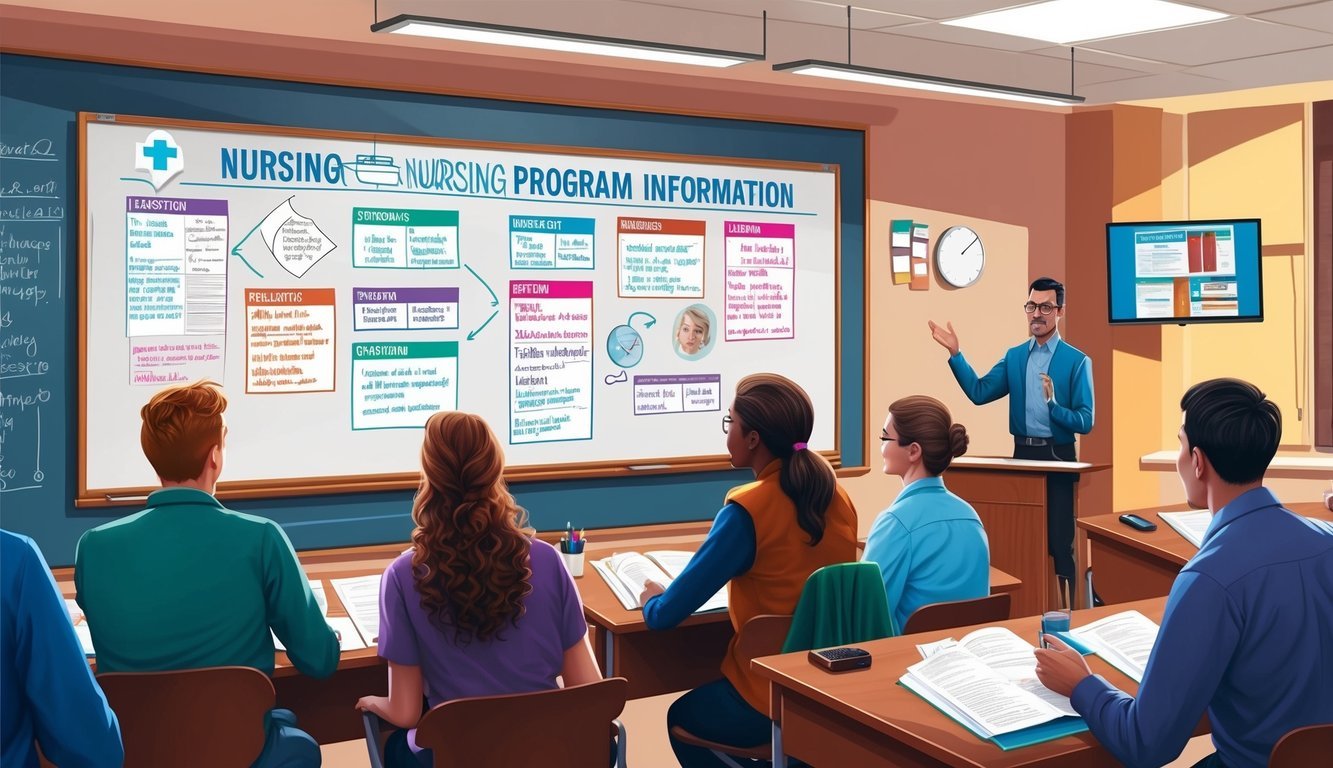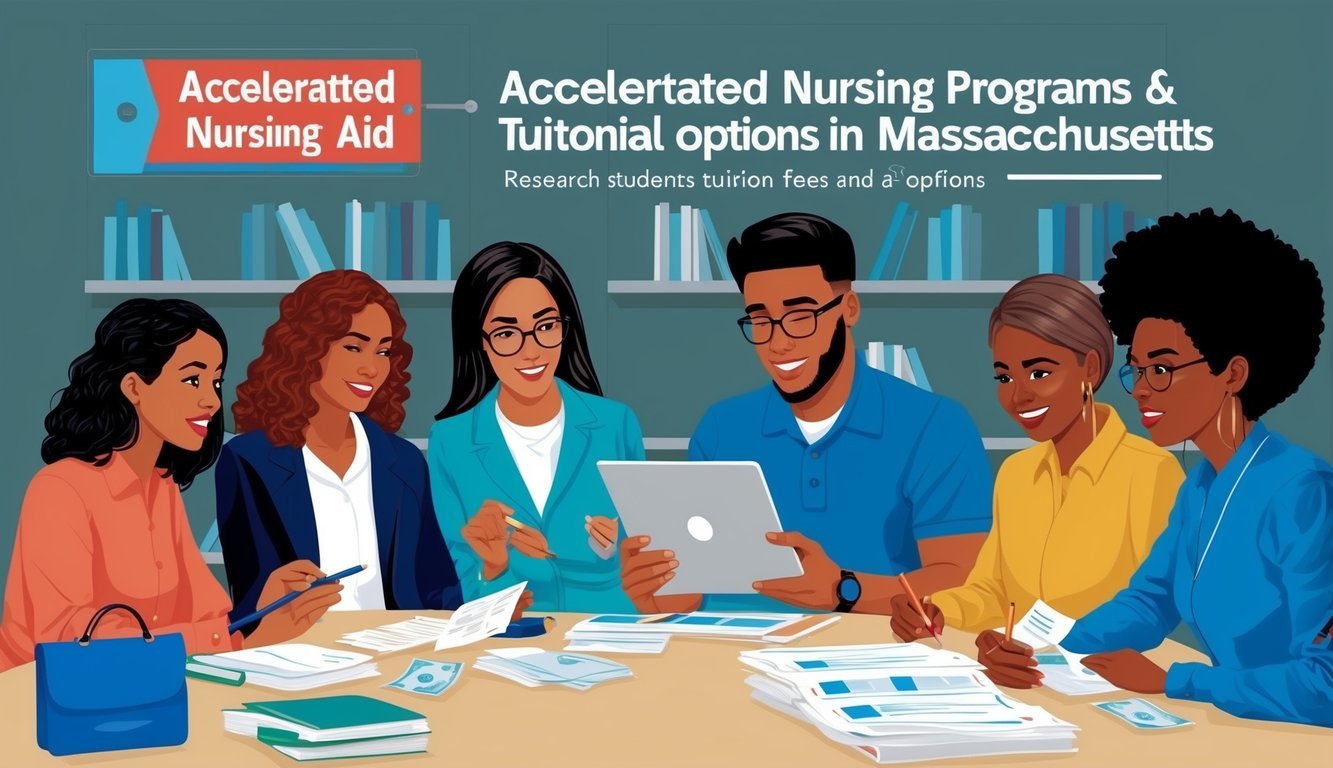If you’re considering a career in nursing and want to expedite your journey without breaking the bank, you’ll find that Massachusetts offers several affordable accelerated nursing programs. The cheapest accelerated nursing programs can help you obtain your degree in as little as one year while minimizing your tuition costs. This pathway is particularly appealing for those who already hold a bachelor’s degree in another field and wish to transition into nursing quickly.
Understanding the financial landscape of these programs is crucial.
You can find options where tuition fees range significantly, from as low as $5,360 at Elms College to around $68,000 at the MGH Institute of Health Professions.
Knowing these costs can help you make an informed decision about which program aligns with your financial and career goals.
As you explore your options, consider the formats and durations of these programs.
Many institutions offer online or hybrid models that allow you to gain clinical experience while completing coursework.
By researching various programs, you can choose one that fits your lifestyle and aspirations in the nursing field.
Overview of Accelerated Nursing Programs in Massachusetts

Accelerated nursing programs in Massachusetts provide a pathway for individuals with a bachelor’s degree in another field to earn a Bachelor of Science in Nursing (BSN) in a condensed timeframe.
These programs typically last 12-18 months, allowing you to transition quickly into a nursing career.
Many programs offer a blend of online and on-campus coursework, catering to diverse learning preferences.
Institutions such as UMass Boston and UMass Dartmouth offer accredited accelerated BSN programs designed to prepare you for the Registered Nurse (RN) licensure exam.
Key Features
| Program Name | Duration | Format | Tuition Estimate |
|---|---|---|---|
| UMass Boston Accelerated BSN | 12 months | Primarily online, some on-campus | $40,000 |
| UMass Dartmouth Accelerated BSN | 16 months | Hybrid (online and on-campus) | $48,000 |
| Elms College Accelerated BSN | 12 months | On-campus | $5,360 |
| MGH Institute of Health Professions | 15 months | On-campus | $68,000 |
These programs not only focus on traditional nursing education but also emphasize critical thinking and hands-on practice, preparing you for the demands of the healthcare industry.
Be sure to check each program’s entrance requirements, which typically include a minimum GPA and a completed bachelor’s degree.
To learn more about specific nursing programs, you can visit resources like UMass Boston’s Nursing Programs and Nursing Process.
Admission Requirements and Prerequisites

When considering accelerated nursing programs in Massachusetts, it’s essential to understand specific admission requirements and prerequisites.
These include academic standards, necessary coursework, and application materials that you must prepare to enhance your chances of acceptance.
Minimum GPA and Academic Standards
Most accelerated nursing programs require you to maintain a minimum cumulative GPA, usually around 3.0 on a 4.0 scale.
This standard reflects your academic proficiency and commitment to the nursing field.
Some programs may have higher GPA requirements depending on the competitiveness of the cohort.
You should be prepared to provide official transcripts from all post-secondary institutions attended, which serve as proof of your academic achievements.
If your GPA slightly falls below the requirement, you can strengthen your application with excellent performance in relevant courses.
Prerequisite Coursework and Healthcare Experience
Before applying, you must complete specific prerequisite courses.
Generally, these include key subjects such as:
| Course | Details |
|---|---|
| Microbiology | Often required for understanding health and disease |
| Chemistry | Basic knowledge aids in pharmacology and patient care |
| Pharmacology | Essential for medication administration and safety |
In addition to coursework, hands-on experience in a healthcare environment is valuable.
Many programs prefer candidates with direct patient care experience, which can range from volunteering to paid positions in medical settings.
This experience reinforces your commitment to nursing and provides insights into patient interaction.
Application Materials: Transcripts, Recommendations, and Statements
Preparing your application involves gathering various materials.
First, you will need to submit official transcripts from all colleges attended—these documents confirm your academic history.
Letters of Recommendation should ideally come from professional references who can attest to your academic or clinical skills.
Select individuals who understand your dedication and ability to succeed in a challenging program.
A Personal Statement is also a crucial component.
This narrative allows you to convey your motivations for pursuing nursing and how your experiences have shaped your career goals.
Ensure your statement is clear, concise, and reflects your passion for healthcare, as this can significantly impact your application’s success.
Curriculum Structure and Content

The curriculum structure of accelerated nursing programs in Massachusetts focuses on developing your nursing skills and clinical competencies through a combination of concept-based learning and extensive clinical training.
The following sections will outline these essential components.
Concept-Based Learning and Clinical Competencies
In accelerated nursing programs, concept-based learning is integral to your education.
This approach emphasizes understanding nursing concepts rather than rote memorization of procedures.
You will engage with materials that link theory to practice, enhancing your clinical judgment as you transition from textbook knowledge to real-world application.
Programs require the completion of 59 credits, which are organized into core nursing concepts.
You can expect courses covering areas like pharmacology, health assessment, and pathophysiology.
These courses are designed to build your critical thinking and problem-solving abilities, necessary for competent patient care.
By adopting this method, you will develop a solid foundation that prepares you for the complexities of nursing practice.
For example, UMass Dartmouth’s program places a strong emphasis on concept-based learning, making connections between various nursing disciplines fundamental to your education.
Clinical Rotations and Hands-On Training
Clinical rotations are critical to gaining practical experience in nursing.
As a full-time student in an accelerated program, you will complete hands-on training across various healthcare settings.
This experience is designed to enhance your clinical skills and reinforce classroom learning.
During your clinical rotations, you will work under the supervision of experienced nurses, allowing you to apply what you’ve learned in real-life situations.
This exposure helps you gain confidence in essential nursing skills, such as patient assessments and care planning.
For instance, programs like the one at UMass Boston may offer diverse rotation opportunities, providing insights into specialties such as pediatrics, geriatrics, and critical care.
Engaging in these clinical experiences ensures you graduate well-prepared for the demands of the nursing profession.
Licensure and Accreditation

Understanding the licensure and accreditation processes is crucial for your journey to becoming a nurse in Massachusetts.
These elements ensure you meet all necessary standards for practice and education, impacting your career trajectory.
NCLEX-RN Preparation and Exam
To become a registered nurse (RN), you must pass the National Council Licensure Examination for Registered Nurses (NCLEX-RN).
This exam assesses your knowledge and competency essential for nursing practice.
Many accelerated nursing programs in Massachusetts integrate NCLEX-RN preparation into their curricula, providing you with the tools and resources needed to succeed.
Key Points to Consider:
- The exam consists of a variety of question formats, including multiple-choice and case studies.
- You must register and pay a fee to take the exam after graduating from an accredited nursing program.
- Preparing for the NCLEX-RN often includes comprehensive review sessions, practice tests, and remediation resources.
Massachusetts Board of Registration in Nursing
Once you pass the NCLEX-RN, you must apply for your nursing license through the Massachusetts Board of Registration in Nursing.
This board oversees the licensing process to ensure that all practicing nurses meet state standards.
Important Steps:
- Submit a completed application with required fees.
- Provide proof of your completed nursing education from an accredited program.
- Undergo a criminal background check.
Your license must be renewed periodically, which typically involves continuing education requirements to maintain your knowledge and skills.
Program Accreditation by CCNE
Choosing an accredited nursing program is vital for your education and future employment.
Programs accredited by the Commission on Collegiate Nursing Education (CCNE) indicate that they meet high standards for educational quality.
Accreditation Benefits:
- Ensures that the program’s curriculum prepares you for the NCLEX-RN.
- Enhances your job prospects as many employers prefer graduates from accredited institutions.
- Impacts eligibility for federal financial aid and student loans.
Ensure that your chosen program in Massachusetts is accredited by the CCNE to support your career goals and licensure requirements effectively.
For a list of accredited programs, refer to the CCNE website.
Costs and Financial Considerations

When exploring accelerated nursing programs in Massachusetts, understanding the costs and available financial resources is crucial for making informed decisions.
The following sections outline tuition fees and potential financial aid options.
Tuition Fees and Expenses
Tuition fees for accelerated nursing programs can vary significantly across institutions.
Below is a comparison of several programs in Massachusetts:
| College/University | Tuition Cost |
|---|---|
| Elms College | $5,360 |
| MCPHS University | $64,200 |
| MGH Institute of Health Professions | $68,000 |
| UMass Boston (Online ABSN) | $???* |
| UMass Dartmouth | See below |
*UMass Boston’s tuition for the accelerated BSN is not specified but generally offers competitive rates.
In addition to tuition, consider other expenses such as registration fees, clinical costs, and materials.
These additional fees can accumulate, impacting your overall budget.
For instance, UMass offers a cost per credit at $695, and you will need to account for 58 credits required for the degree.
Financial Aid and Scholarships
Many institutions provide various financial aid options to support students.
Below are common avenues for financial assistance:
- Federal Financial Aid: You may qualify for federal loans and grants by completing the FAFSA.
- Scholarships: Numerous scholarships target nursing students specifically. Research institutional scholarships as well as those offered by foundations.
For example, consider checking out nursing scholarships or specific programs at your chosen college.
Additionally, inquire about work-study programs, which can provide both income and valuable experience.
Understanding these options can help alleviate financial burdens while pursuing your nursing degree.
Career Prospects and Continuing Education
As a graduate from an accelerated nursing program, numerous career paths and educational opportunities await you.
Understanding your job prospects and options for advanced education can significantly shape your nursing career.
Job Opportunities in Hospitals and Clinics
With a Bachelor of Science in Nursing (BSN), you qualify for various positions in hospitals and clinics.
Many healthcare facilities prioritize hiring baccalaureate-prepared registered nurses, as they are trained to provide comprehensive nursing care.
Common roles include:
- Staff Nurse: Provides direct patient care, assesses needs, and develops care plans.
- Nurse Practitioner: Offers advanced healthcare services, diagnoses conditions, and prescribes medications.
- Clinical Nurse Specialist: Specializes in specific areas, such as cardiology or oncology.
The U.S. Bureau of Labor Statistics projects a 6% growth in job opportunities for registered nurses from 2021 to 2031.
This demand indicates a stable job market for your future.
Advanced Degrees for Nursing Professionals
Pursuing advanced degrees can enhance your career prospects and professional development.
Many registered nurses opt for further education to specialize or move into leadership roles.
Popular advanced degrees include:
- Master of Science in Nursing (MSN): Prepares you for roles such as nurse educator or nurse administrator.
- Doctor of Nursing Practice (DNP): Focuses on clinical practice, leadership, and policy.
These programs often offer flexible scheduling and online options, making them accessible for working professionals.
Advanced education not only opens doors for higher-paying positions but also equips you with critical skills for patient care and health system management.
Leadership Roles and Nurse Education
Pursuing leadership roles or becoming a nurse educator can reward your career.
In leadership positions, you may oversee nursing teams, improve patient care practices, and influence healthcare policies.
These roles require skills in management and strategic planning.
Alternatively, as a nurse educator, you play a vital role in shaping future nurses.
You may work in academic settings or clinical training environments.
- Key responsibilities include developing curriculum, teaching courses, and mentoring students.
Both paths offer opportunities to contribute to the nursing profession while advancing your career.
Embracing continuous education and leadership opportunities positions you as a key player in the evolving healthcare landscape.

